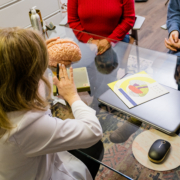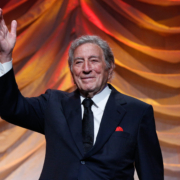Pieces of Her
A son reflects on his family’s struggle with his mother’s dementia
She says she recognizes the hills and water and sky as we pull into the dirt parking lot at the head of the trail. Maybe the door to the unpredictable dark tower elevator of her mind has opened onto a familiar floor, and this will be a better day.
We carry our fly fishing rods down to the spring creek and I wade off the near bank, while she follows my dad a couple hundred yards upstream. Her encouraging platitudes as he casts his line drift watery relief around my bare calves. Finally, he’s able to do something fun, something he’s earned, without her demanding to be anywhere other than wherever they are.
After fewer caught fish than strikes I see her walking the trail back up to the truck. I yell and wave. She strains to shout that she’s just going to sit down, and she’ll see me soon.
She sounds happy.
But I know what this may become, so I bring in my line, trudge out of the creek, and hustle up the trail after her. My dad is already ahead of me, trying to catch her before she gets to the truck. As I approach the open passenger door, she sputters in anger that she’s hot and doesn’t want to talk to me anymore.
My dad hits the brakes on a bridge linking the dirt road to the two-lane highway, and asks her if she wants to see the bigger fish congregating in the shadows below. She whispers “I don’t want to” in between sobs, the toddler intonation reminding me of the year before when we were caught in a rainstorm in the Scottish countryside and all she could say was “I’m so cold.”
I watch her in the side mirror as the truck cuts home through the prairie. She fights and loses to waves of tears, her mouth turned downward in sadness, or anger, or something else entirely. Maybe she’s thinking about what’s happening to her now, or what happened to her as a kid in foster care.
I don’t really know. I never do. She doesn’t talk when she’s crying, but when they drop me off on their way to a doctor’s appointment, I open the passenger door, ask what’s wrong, and brush away the lone tear running down her cheek.
She shakes her head.
“Nothing to do with you.”
Which isn’t true, of course. Everything about this has something to do with me.
I shut her door, step back on the gravel driveway, and watch the truck disappear into the dust.
The truck, and another piece of her.
. . .
Many more pieces of her have fallen away since that trip to the creek. Pieces my father has tried in vain to catch, her fine grains of dust disappearing faster as he tightens his grip. Because if he doesn’t let go, she will still be with him.
As she has been for over 65 years, their number of nights spent apart fewer than the turning of autumn to winter. And so my father balls his fingers into a fist, minimizing his struggles with her violent mood swings and papering over her tendency to get lost, with assurances that she’s always been found. He doesn’t mention the police helicopter and missing persons report, or the skin torn from his forearm by her aggressive fingernails.
Neurologist appointments have been scheduled and canceled over the years, a brain scan from 2016 never interpreted. Until last week, when we finally convinced my father to take my mom to a world-class neurologist. We thought that if we could help her, we could help him, because everyone in the family can see the toll that being her full-time caregiver is taking on him.
She was diagnosed, finally, with late-stage Alzheimer’s. And even then, my dad fought the neurologist, questioning the doctor’s confidence and requesting another current scan just to be sure.
My father and I manage much of life the same. But where he is seated in deep denial, I have tried to find deep acceptance by dealing with losing my mom the only way I know…turning inward to write both prose and lyric, and recording music seeded in the dirt of this journey. Not long ago I sang one of those songs to my mother, my voice breaking more for the sender than the woman sitting across from me, who I knew was losing each word as it was heard.
. . .
Where are you going
So far away
You’re further down the road
Every day
I don’t know what to do now
To bring you back to me
Where are you going
Amy
Sometimes I still see you
Like it was yesterday
Before autumn light on blonde hair
Faded to gray
Watching this ain’t easy
So I hold my memory
Sometimes I still see you
Amy
I hear a whisper on the night wind
I see a flicker in the dark
Along this road we travel
Searching for a spark
I’m going to start a fire tonight
With all the tender I can find
To light your slow walk home
Through this shadow in your mind
If you can see where you are going
The road will bring you back to me
The road will only be a circle
The road will only be a circle
The road is only a circle
Amy
. . .
And I suppose this is where I am now, years after that trip to the creek, days removed from a devastating diagnosis.
Searching for a spark.
I guess I’m still holding on, too.
Alex Woodard is a writer based in Southern California. Learn more about him here.









